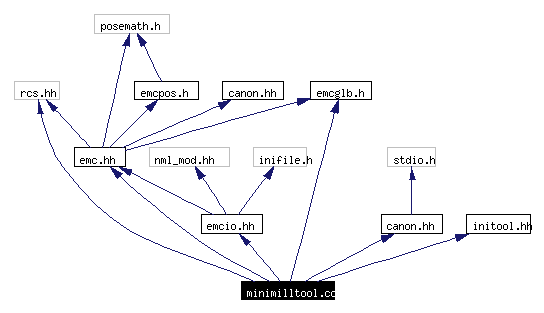
#include "rcs.hh"#include "emc.hh"#include "canon.hh"#include "emcio.hh"#include "emcglb.h"#include "initool.hh"Include dependency graph for minimilltool.cc:

Go to the source code of this file.
Defines | |
| #define | __attribute__(x) |
| #define | auxStatus ((EMC_AUX_STAT *) statusInData[auxSubNum]) |
Functions | |
| char | __attribute__ ((unused)) ident[]="$Id |
| int | saveToolTable (const char *filename, CANON_TOOL_TABLE toolTable[]) |
|
|
Definition at line 27 of file minimilltool.cc. |
|
|
|
|
|
Definition at line 31 of file minimilltool.cc. 00031 : minimilltool.cc,v 1.4 2001/06/29 20:27:29 wshackle Exp $";
00032
00033 // shortcuts to NML module subordinate statuses
00034 #define auxStatus ((EMC_AUX_STAT *) statusInData[auxSubNum])
00035
00036 /*
00037 load the tool table from file filename into toolTable[] array.
00038 Array is CANON_TOOL_MAX + 1 entries, since 0 is included.
00039
00040 If filename is "", use global established from ini file
00041 */
00042 static int loadToolTable(const char *filename, CANON_TOOL_TABLE toolTable[])
00043 {
00044 int t;
00045 FILE *fp;
00046 char buffer[CANON_TOOL_ENTRY_LEN];
00047 const char *name;
00048
00049 // check filename
00050 if (filename[0] == 0)
00051 {
00052 name = TOOL_TABLE_FILE;
00053 }
00054 else
00055 {
00056 // point to name provided
00057 name = filename;
00058 }
00059
00060 // open tool table file
00061 if (NULL == (fp = fopen(name, "r")))
00062 {
00063 // can't open file
00064 return -1;
00065 }
00066
00067 // clear out tool table
00068 for (t = 0; t <= CANON_TOOL_MAX; t++)
00069 {
00070 // unused tools are 0, 0.0, 0.0
00071 toolTable[t].id = 0;
00072 toolTable[t].length = 0.0;
00073 toolTable[t].diameter = 0.0;
00074 }
00075
00076 /*
00077 Override 0's with codes from tool file
00078
00079 File format is:
00080
00081 <header>
00082 <pocket # 0..CANON_TOOL_MAX> <FMS id> <length> <diameter>
00083 ...
00084
00085 */
00086
00087 // read and discard header
00088 if (NULL == fgets(buffer, 256, fp))
00089 {
00090 // nothing in file at all
00091 fclose(fp);
00092 return -1;
00093 }
00094
00095 while (!feof(fp))
00096 {
00097 int pocket;
00098 int id;
00099 double length;
00100 double diameter;
00101
00102 // just read pocket, ID, and length offset
00103 if (NULL == fgets(buffer, CANON_TOOL_ENTRY_LEN, fp))
00104 {
00105 break;
00106 }
00107
00108 if (4 != sscanf(buffer, "%d %d %lf %lf",
00109 &pocket, &id, &length, &diameter))
00110 {
00111 // bad entry-- skip
00112 continue;
00113 }
00114 else
00115 {
00116 if (pocket < 0 || pocket > CANON_TOOL_MAX)
00117 {
00118 continue;
00119 }
00120 else
00121 {
00122 toolTable[pocket].id = id;
00123 toolTable[pocket].length = length;
00124 toolTable[pocket].diameter = diameter;
00125 }
00126 }
00127 }
00128
00129 // close the file
00130 fclose(fp);
00131
00132 return 0;
00133 }
|
|
||||||||||||
|
Definition at line 141 of file minimilltool.cc. Referenced by EMC_TOOL_MODULE::TOOL_SET_OFFSET().
00142 {
00143 int pocket;
00144 FILE *fp;
00145 const char *name;
00146
00147 // check filename
00148 if (filename[0] == 0)
00149 {
00150 name = TOOL_TABLE_FILE;
00151 }
00152 else
00153 {
00154 // point to name provided
00155 name = filename;
00156 }
00157
00158 // open tool table file
00159 if (NULL == (fp = fopen(name, "w")))
00160 {
00161 // can't open file
00162 return -1;
00163 }
00164
00165 // write header
00166 fprintf(fp, "POC\tFMS\tLEN\t\tDIAM\n");
00167
00168 for (pocket = 1; pocket <= CANON_TOOL_MAX; pocket++)
00169 {
00170 fprintf(fp, "%d\t%d\t%f\t%f\n",
00171 pocket,
00172 toolTable[pocket].id,
00173 toolTable[pocket].length,
00174 toolTable[pocket].diameter);
00175 }
00176
00177 // close the file
00178 fclose(fp);
00179
00180 return 0;
00181 }
|
 1.2.11.1 written by Dimitri van Heesch,
© 1997-2001
1.2.11.1 written by Dimitri van Heesch,
© 1997-2001